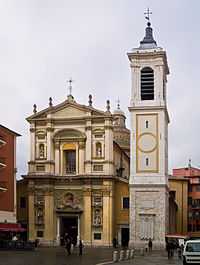Nice Cathedral

Nice Cathedral (French: Basilique-Cathédrale Sainte-Marie et Sainte-Réparate de Nice) is the cathedral of the Diocese of Nice and is located in the old town of Nice in the south of France. It was built between 1650 and 1699, the year of its consecration. It is dedicated to the Assumption of the Virgin Mary and Saint Reparata.[1]
It has been classed as a monument historique since 9 August 1906.
History
The first church on the site was built in the early 13th century on land belonging to the Abbey of St. Pons and became a parish church in 1246.[2]
During the first half of the 16th century a series of acts gradually effected the transfer of the seat of the bishops of Nice from Cimiez Cathedral on the hill of the castle overlooking the city to the church of Saint Reparata which in 1590, after an official ceremony presided over by the then bishop, Luigi Pallavicini, and in the presence of Charles Emmanuel I, Duke of Savoy, was recognised as a chiesa-cattedrale.[3]
However, in 1649, judging the building too small, bishop Didier Palletis commissioned the architect Jean-André Guibert to produce a structure more in keeping with the importance of the city.
The cathedral was declared a minor basilica on 27 May 1949.[4]
Description
Exterior
Originally rectangular and oriented to the north, the cathedral was rebuilt on the model of Santa Susanna in Rome. i.e., on a Latin cross ground plan oriented to the east, with a cupola, clad in coloured tiles varnished in the Genoese style, over the transept crossing. The building is in the Baroque style.
A number of alterations have taken place since the initial construction. A campanile was built between 1731 and 1757, which partially obscures the cupola. Between 1825 and 1830 a Baroque revival façade replaced the original west front. Between 1900 and 1903 an apse was added on either side of the choir.
Interior
The interior, also Baroque, includes ten chapels, dedicated to: Our Lady of the Seven Sorrows, the Crucifixion, Saint Rose of Lima, Saints Alexander and Bartholomew, the Holy Sacrament, Saint Rosalia and the Virgin, Saint Joseph, Saint Reparata, the Four Crowned Martyrs and Saint John the Baptist. Until the end of the 17th century each of them was connected to a different guild which had the responsibility and expense of maintaining them. The high altar is surmounted by a picture of the Glory of Saint Reparata, the virgin martyr to whom the cathedral is dedicated and whose relics have been enshrined here since 1690.
Organs
The cathedral contains three organs: one is on a tribune above the narthex, another in the north arm of the transept and the third in the choir rehearsal room.
References
- ↑ GCatholic.org
- ↑ Luc Thevenon, "Du château vers le Paillon. Le développement urbain de Nice de la fin de l'Antiquité à l'Empire", Serre éditeur, coll. "Forum d'Urbanisme et d'Architecture", Nice, 1999, p.38 (ISBN 2-86410-302-8)
- ↑ Luc Thevenon, op. cit., p. 110
- ↑ GCatholic.org
Sources and external links
| Wikimedia Commons has media related to Nice Cathedral. |
- Ministry of Culture website: Nice Cathedral (French)
- Monum.fr: Nice Cathedral (French)
- Structurae.de: Nice Cathedral (French)
- Nice Cathedral official website (French)